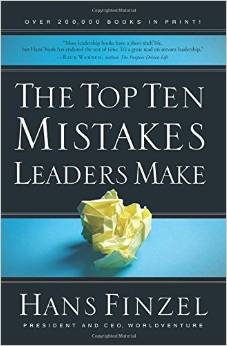Mistakes leaders make (6/10)
joeacast
I’m working my way through a book, The Top 10 Mistakes Leaders Make, by Hans Finzel, and I’m really enjoying the challenge. So for the next ten Saturdays I want to work through these ten mistakes, knowing that they apply to CEOs, ministry leaders, parents, teachers, coaches, pastors and just about anyone in any kind of leadership role.
I promise to keep my summaries short(ish), and I would love to interact with your thoughts as we go along. These mistakes are listed in order of how they occur in the book, not necessarily how I would arrange them. Overboard Leadership requires an honest self-evaluation of each of these shortcomings (sins?) of leaders. Looking for missed posts, click here: Mistake #1, Mistake #2, Mistake #3, Mistake #4, Mistake #5)
-----
Mistake #6: Dirty Delegation
I’m convinced that there are few more defeating mistakes made by leaders, than the mistake of dirty delegation. A top-down leader can dominate followers into frustration. A paperwork leader elevates task over people. A non-affirming leader has followers that aren’t sure if they are valued. A leader who rejects Mavericks has a team that is constantly stuck. A dictator robs his team or family of their creative freedom. And a dirty delegator creates a defeated, broken-spirited, culture.
What is dirty delegation? It’s the not-so-fine art of giving projects to personnel, only to add someone to the team, or invite someone else to do the same project, without communicating your intent. It’s asking a team member to work on a project, then outsourcing it to someone else or bringing in outside eyes to evaluate without communicating your actions. Top-down leaders and dictators can easily fall into the trap of dirty delegation...along with anyone else who has ever led a team.
Why? Because delegation is hard for many leaders! Maybe you relate to one of these fears about delegation?
- Fear of losing authority
- Concern for the quality of work (no one can do it as well as you, right?)
- Fear of work being done better (uh-oh...someone else might do your job better than you!)
- Unwillingness to take the time
- Too disorganize to even give necessary details about the area needing delegation
- Lack of leadership training or other positive delegation experiences
- Fear of losing value within the organization
Theodore Roosevelt said, “The best executive is the one who has the sense enough to pick good men to do what he wants done, and self-restraint enough to keep from meddling with them while they do it.” Dirty delegators usually push the good men and women away from their group because they lack the self-restraint to allow them to produce. Good leaders recognize the delegation allows for personal ownership and investment, and this is crucial for: happiness in the home or workplace; inspiration for creative new ideas; freedom for personal expression and the opportunity to learn from mistakes.
Kaleo Korner (By Justin VanRheene, founder of Kaleo Media)
I’ve had jobs and have watched friends be employed in places that have managers that succumb to the fears above. Its very frustrating. Here are a few ways I’ve seen help bringing clarity, and empowering productivity.
Start with why. One principle I start with on all new clients is, start with why? Having a clear understanding of the big idea will help bring freedom to employees as you begin going after the four parts of delegation that Finzel states: assignment, authority, accountability, and affirmation.
“Because I said so?” As a parent, coach, teacher, etc. I’m sure you’ve said, or wanted to say, when questioned about a project, assignment, or task, “Because I said so!” Being in a position of authority, that seems like a great thing to say because you’re the boss. There is an older volunteer I work with at my church, who said one time, “Has that ever worked?” I’m not sure it has but I’m in my 30s and I heard it when I was a kid.
But so many of the things we’ll be involved in as a leader demand more than a “because I said so.” They require vision. And believe it or not, those who struggle with dirty delegation, don’t have a vision for their organization. In many situations, their identity is their organization and to leave their reputation in the hands of someone else is just not possible.
If anyone had the right to over-manage, it was Jesus. If anyone was confident he could do a job better, it was Jesus! And yet, as His ministry progressed, He began to release more and more opportunities for His disciples! On one occasion in the Gospel, he sent out 72 disciples to spread the Good News all over Israel, and He gave them power and authority to do miracles, to heal sick people, to cast out demonic spirits and to put a blessing (or curse!) on the towns they entered (Luke 10:1-24). Jesus delegate real opportunity, real authority and gave his followers a chance to experience the joy of ministry (10:17, 10:21).
Han says there are four parts to real delegation: Assignment, authority, accountability and affirmation. These four parts answer the main questions most followers have. What am I supposed to do? An assignment answers the question that is tops on most children, team mates, employees, managers or coaches, the question about activity. What is my job?
Once they know the “what”, they want to know if they will have the freedom and authority to execute that task: Will you let me do it? If you assign the brand redesign to an employee, but don’t provide the time or financial resources to accomplish the task, they will fail. Do they have the authority to do the task? The next question is, Will you help me when I need it? It’s the question of accountability and follow up: will you help them through the process and check on their progress along the way?
Finally, the fourth question employees ask is, Will you let me know how I’m doing? Every follower wants to know that their work is valuable, helpful and contributing to the overall goal! Does the word affirmation mean anything to you (Mistake #3)??
Of course, every follower has a different capacity for delegation. Not all followers can handle, or even desire, stand alone work. Some players are just more efficient, effective and happy when working under closer supervision. Others want a long leash and only occasional check-ins. Learning how each of your team members works is crucial, and honestly, it’s why many leaders don’t delegate. The work of learning who your team members operate, is sometimes harder than the work of releasing the labor!
I love the list Finzel ends the chapter with, giving 9 guidelines for clean delegation:
- Choose qualified people
- Exhibit confidence in your team
- Clarify duties
- Delegate proper authority for the work
- Avoid telling them how to do the work you’ve just given them
- Set up accountability points throughout the project
- Supervise according to their work style
- Give room for mistakes
- Give praise and credit for work well done
Delegation can be challenging, but if you want to multiply your effectiveness and influence, it’s a skill worth mastering.
So go ahead and take the plunge, your leadership will be better on the water!
Joe Castaneda
Special thanks to Justin VanRheenen, friend and founder of Kaleo Media. If you want to increase your online presence, or improve your social media content and skills, contact Justin and learn from him!

